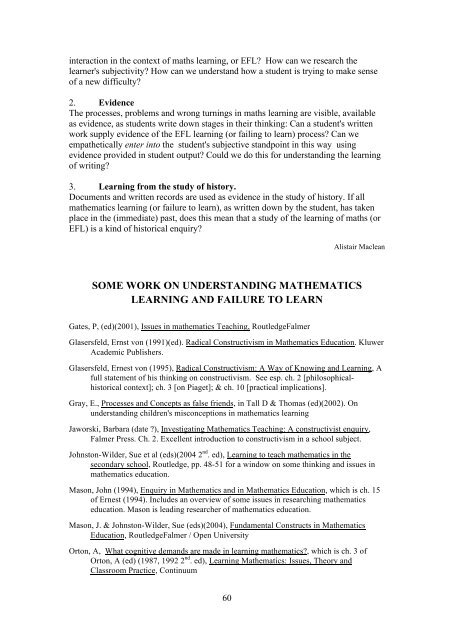RADICAL TEFL
2hqhXJd
2hqhXJd
Create successful ePaper yourself
Turn your PDF publications into a flip-book with our unique Google optimized e-Paper software.
interaction in the context of maths learning, or EFL? How can we research the<br />
learner's subjectivity? How can we understand how a student is trying to make sense<br />
of a new difficulty?<br />
2. Evidence<br />
The processes, problems and wrong turnings in maths learning are visible, available<br />
as evidence, as students write down stages in their thinking: Can a student's written<br />
work supply evidence of the EFL learning (or failing to learn) process? Can we<br />
empathetically enter into the student's subjective standpoint in this way using<br />
evidence provided in student output? Could we do this for understanding the learning<br />
of writing?<br />
3. Learning from the study of history.<br />
Documents and written records are used as evidence in the study of history. If all<br />
mathematics learning (or failure to learn), as written down by the student, has taken<br />
place in the (immediate) past, does this mean that a study of the learning of maths (or<br />
EFL) is a kind of historical enquiry?<br />
Alistair Maclean<br />
SOME WORK ON UNDERSTANDING MATHEMATICS<br />
LEARNING AND FAILURE TO LEARN<br />
Gates, P, (ed)(2001), Issues in mathematics Teaching, RoutledgeFalmer<br />
Glasersfeld, Ernst von (1991)(ed). Radical Constructivism in Mathematics Education. Kluwer<br />
Academic Publishers.<br />
Glasersfeld, Ernest von (1995), Radical Constructivism: A Way of Knowing and Learning, A<br />
full statement of his thinking on constructivism. See esp. ch. 2 [philosophicalhistorical<br />
context]; ch. 3 [on Piaget]; & ch. 10 [practical implications].<br />
Gray, E., Processes and Concepts as false friends, in Tall D & Thomas (ed)(2002). On<br />
understanding children's misconceptions in mathematics learning<br />
Jaworski, Barbara (date ?), Investigating Mathematics Teaching: A constructivist enquiry,<br />
Falmer Press. Ch. 2. Excellent introduction to constructivism in a school subject.<br />
Johnston-Wilder, Sue et al (eds)(2004 2 nd . ed), Learning to teach mathematics in the<br />
secondary school, Routledge, pp. 48-51 for a window on some thinking and issues in<br />
mathematics education.<br />
Mason, John (1994), Enquiry in Mathematics and in Mathematics Education, which is ch. 15<br />
of Ernest (1994). Includes an overview of some issues in researching mathematics<br />
education. Mason is leading researcher of mathematics education.<br />
Mason, J. & Johnston-Wilder, Sue (eds)(2004), Fundamental Constructs in Mathematics<br />
Education, RoutledgeFalmer / Open University<br />
Orton, A, What cognitive demands are made in learning mathematics?, which is ch. 3 of<br />
Orton, A (ed) (1987, 1992 2 nd . ed), Learning Mathematics: Issues, Theory and<br />
Classroom Practice, Continuum<br />
60


